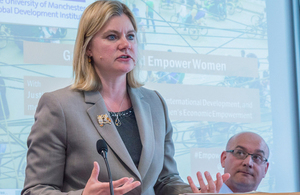How do we reach gender equality, Justine Greening asks Manchester students
The International Development Secretary visited Manchester to discuss how women’s economic opportunities can be improved around the world.

Justine Greening speaking during Manchester visit. Picture: University of Manchester
International Development Secretary Justine Greening has discussed with university students, top business leaders and gender specialists in Manchester how women’s economic opportunities can be improved around the world, so she can put their views to the United Nations.
Leading an expert panel from the University of Manchester, which included Professor David Hulme, Executive Director of the Global Development Institute (GDI), and Professor Stephanie Barrientos, GDI’s Director of Social Responsibility, the audience’s participation provided invaluable feedback for Ms Greening to take back to UN High Level Panel on Women’s Economic Empowerment, of which she is a founding member, and use it to jump start the global movement on gender equality.
During the event, Ms Greening heard from young people about their own experiences of economic empowerment and the barriers that have previously gotten in the way. As well as students and academics from the GDI, the audience was made up of around 60 delegates from organisations such as Women Worldwide, Women in Informal Employment: Globalizing and Organising (WIEGO) and the Princes Trust International.
International Development Secretary Justine Greening said:
Unlocking the potential of women and girls worldwide isn’t only the right thing to do, it’s the smart thing. No country can ever properly develop if it leaves half its population behind. I want women and girls all over the world to have the step up they need, the opportunity to realise and seize their potential.
I will take the experiences and views of the students, academics and business leaders I met in Manchester today with me to the UN High Level Panel on Women’s Economic Empowerment later this year.
Professor Hulme said:
We were chosen to host the event due to the Global Development Institute’s outstanding reputation and work in the field of international gender equality and economic empowerment.
We’d like to thank the Secretary of State for asking the GDI to host the event and contribute to what is an immensely important debate, both in the UK and overseas. Economic equality and empowerment is one of the fundamental drivers of stability and inclusive growth for any nation’s economy. The expertise and ideas of researchers can deliver concrete steps to help achieve such goals.
This is the latest in a series of consultations Justine Greening is conducting on the subject and last week saw her visit Birmingham where she hosted a round table and met with local business leaders.
The Secretary of State for International Development is calling on all businesses to take this survey to help identify both the challenges and successes businesses have experienced in getting more women into work.
Notes to editors
-
Despite an additional 250 million women entering the global workforce since 2006, wage inequality continues, with women now only earning what men did a decade ago. (SOURCE: World Economic Forum’s ‘Global Gender Gap’ report)
-
In 17 countries, husbands can still legally prevent their wives from working. In 29 countries, women are prohibited from working at night. In 34 countries, women do not have the same inheritance rights as men. (SOURCE: World Bank’s ‘Women, Business and the Law 2016’ report).